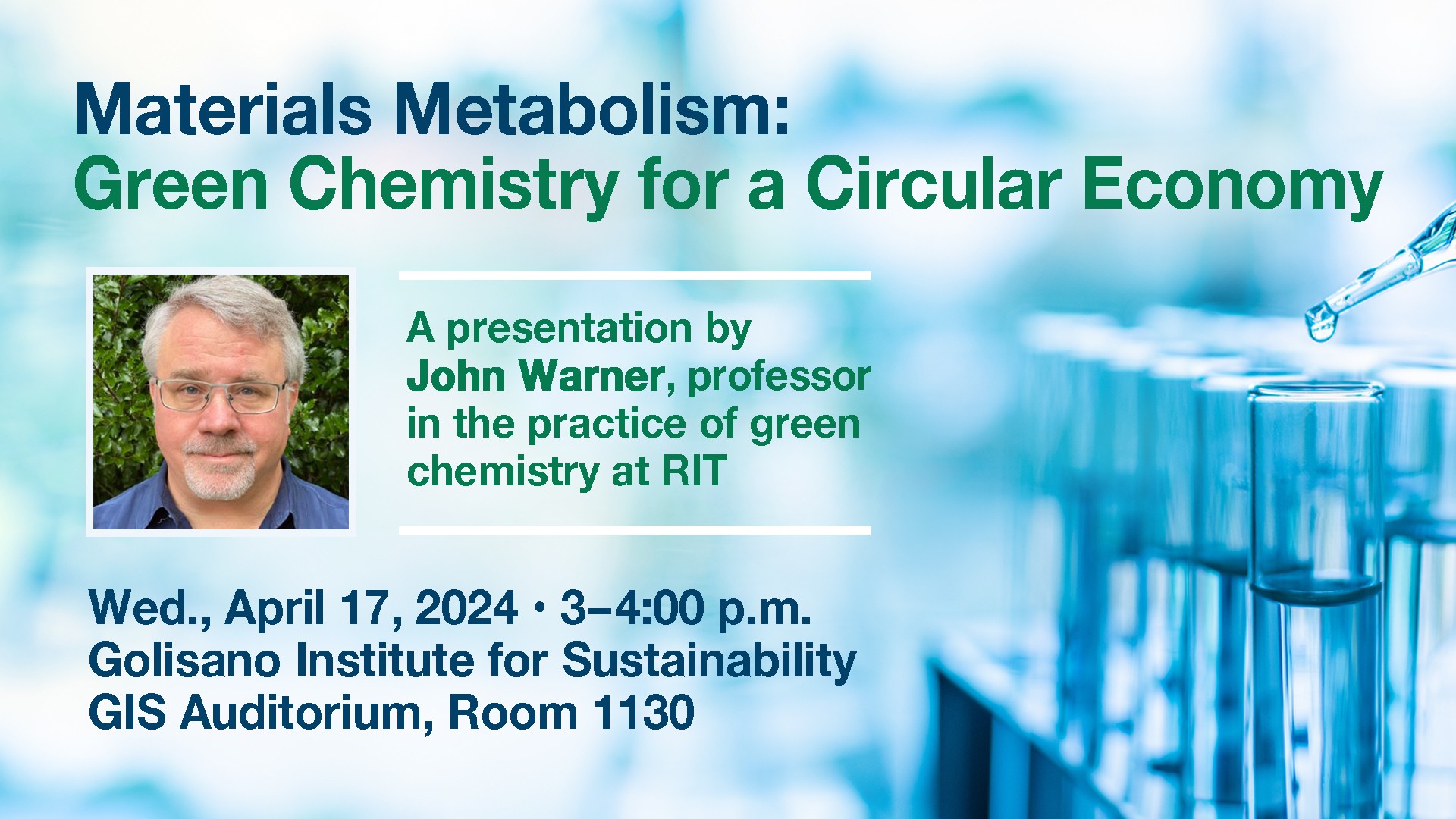Materials Metabolism: Green Chemistry for a Circular Economy

A presentation by John Warner, professor in the practice of green chemistry in the Golisano Institute for Sustainability at RIT
What to expect
As we design products to be more sustainable and to fit within a circular economy, we are best served to recognize and learn from patterns within nature. There exists a circular pendulum that swings between the natural world of stable ecosystems and the human built world of products. Centrally located between these two systems exists the domain of the “materials metabolism”—the molecular mechanistic foundation of the assembly and disassembly of molecules and materials. Nature typically carries out the deconstruction and construction of materials through catabolism and anabolism, performing both metabolic processes synchronously. Human industrial design has evolved to perform the synthesis and breakdown of processes spatially and temporally separate. The principles of green chemistry provide a logical framework to design products within the materials metabolism. This presentation will highlight the general concept of the materials metabolism and provide real world green chemistry examples.
John Warner joins RIT as part-time professor in the practice of green chemistry at the New York State Pollution Prevention Institute (NYSP2I) at the Golisano Institute for Sustainability. John is a chemistry inventor who works to design and create commercial technologies inspired by nature consistent with the principles of green chemistry. With over 300 patents, he has invented solutions for dozens of multinational corporations. His inventions have also served as the basis for several new companies. Examples include: Collaborative Medicinal Development (ALS therapy), Hairprint (hair color restoration), Collaborative Aggregates (asphalt warm mix rejuvenators), Ambient Photonics (lowlight indoor photovoltaic devices for IoT and BIPV).
He is one of the cofounders of the field of green chemistry, coauthoring the defining text “Green Chemistry: Theory and Practice” and articulating the 12 principles of green chemistry with Paul Anastas. John has over 100 publications providing foundational work in the fields of noncovalent derivatization, polymer photochemistry, metal oxide semiconductors and synthetic organic chemistry. John has received prestigious awards as an academic (Presidential Award for Excellence in Science Mentoring – President G. W. Bush & NSF, 2004) and the August Wilhelm von Hofmann Medal from the German Chemical Society, 2022), industrial chemist (Perkin Medal – Society of Chemical Industry, 2014), inventor (Lemelson Ambassadorship – Lemelson Foundation & AAAS) and for governmental chemicals policy (Reinventing Government National Performance Review – Vice President A. Gore & EPA, 1997). He received the American Institute of Chemistry’s Northeast Division’s Distinguished Chemist of the Year for 2002 and the Council of Science Society President’s 2008 Leadership award. Warner was named by ICI Services as one of the most influential people impacting the global chemical industries. In 2011 he was elected a Fellow of the American Chemical Society and named one of “25 Visionaries Changing the World” by Utne Reader. He serves as Distinguished Professor of Green Chemistry at Monash University in Australia and was named an Honorary Professor at the Technical University of Berlin. He served as the 2020 and 2021 Global Chair for the Center for Sustainable and Circular Technologies at the University of Bath. In 2017 the German Ministry of Economic Affairs and The Technical University of Berlin announced the naming of “The John Warner Center for Green Chemistry Start-Ups” in his honor. He serves as strategic advisor for the Science, Engineering and Health Committee of EPA Victoria in Australia. John received his BS in Chemistry from UMASS Boston, and his PhD in Chemistry from Princeton University.
Event Snapshot
When and Where
Who
This is an RIT Only Event
| Cost | FREE |
Interpreter Requested?
No









